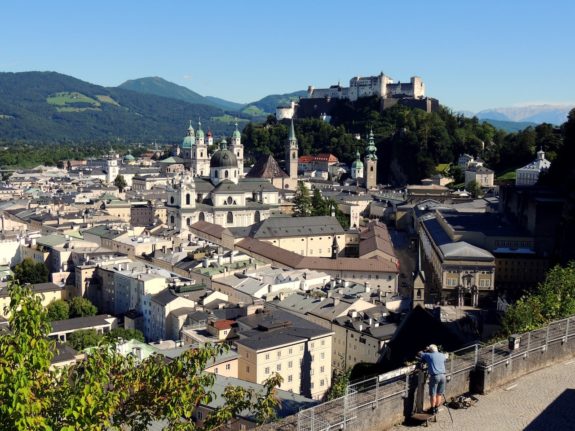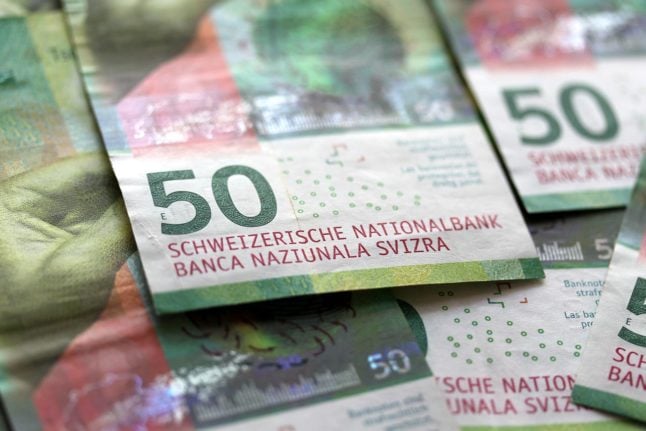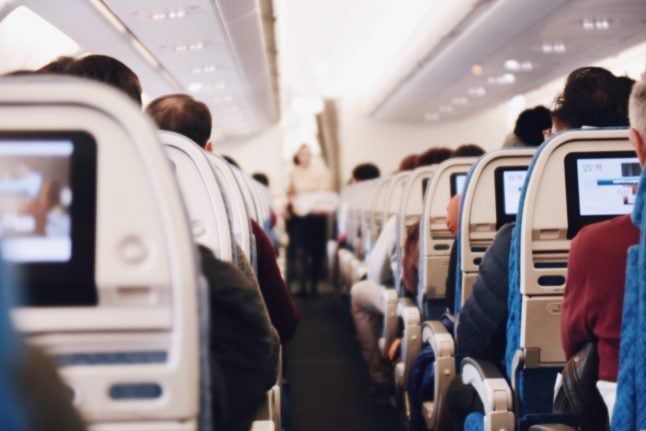Everything that changes in Austria in 2023

From new Klimabonus payments to changes in the TV and Radio fee GIS, here are some of the major changes you should know about in Austria in 2023.
New Klimabonus payments for 2022 and 2023 will be sent out
The Klimabonus, a €500 payment sent by the government to help cushion the effects of the higher cost of living, will be sent out again in 2022.
There will be two types of payment in 2023. The first type is the second round of payments concerning 2022. These will be made starting February 2023 to all entitled in 2022 but who did not receive their money.
People who recently moved to Austria in 2022 and will have lived in the Alpine country for at least 181 days in the years are among those that should receive the €500 amount in the second round of payments. Children born in 2022 and who will have been at least 181 days old by the end of the year will also receive a payment – though minors are entitled to €250.
Additionally, those who, by mistake, did not get their payments in 2022 will also receive them starting February 2023.
However, even those who received the Klimabonus in 2022 will also receive another payment in 2023. Don’t get too excited; it will be far from the €500 subsidy the government offered in 2022.
The total amount of the Klimabonus will depend on where you live. For example, in Vienna, the payment will be €100. The maximum amount across Austria will be €250.
READ MORE: Reader question: Will I get another Klimabonus payment next year in Austria?
Austria to scrap broker's fee on apartment rentals
From July 1st, 2023, the Bestellerprinzip (buyer’s principle) will apply to apartment rentals meaning those who hire a broker will pay for the service, the Austrian government said.
Currently, renters need to pay several fees when moving into a new apartment, including a security deposit and the first month’s rent.
Unless the property is rented “privately” by the owner without the brokerage firm intermediate, one of those fees includes the so-called ‘Provision‘, a brokerage fee paid by the tenant equivalent to two-months rent.
Tenants must pay that fee even if they find the apartment online, for example. Once a broker acts as an intermediate, the renter pays the fee even if the property owner hires them.
That is set to change on July 1st 2023. The brokerage fee will have to be paid by whoever hired the service.
READ ALSO: Renting in Austria: How much can the landlord ask for as a deposit?
New rules for GIS to be announced
In 2022, the Austrian Constitutional Court ruled that receiving TV programmes online and streaming them without paying so-called GIS fees is “unconstitutional”, as The Local reported.
As a consequence, the court has asked the legislative powers (Austria’s National Council, Federal Council and Federal Assembly) to take action by “closing the streaming gap” by end of 2023.
GIS is Austria's TV and radio licence that can set people who have TV equipment at home back between €22.45 and €28.25, depending on the state, a month. Most of that money goes to the public broadcaster ORF and pays for in-house productions, broadcasting equipment, technical equipment, licenses and more.
Even people who don’t watch ORF programmes need to pay for GIS, as long as they have a device capable of receiving the broadcast. However, those who don't pay for it because they don't have such device can still stream the content online - which is what the court ruled as unconstitutional.
By the end of 2023, Austria’s Parliament will have to decide on new rules not to exempt those who access ORF online from payment.
This could mean that everyone in Austria will have to pay the infamous fee. Or perhaps everyone with either/or a TV capable of receiving broadcast, a radio, or Internet access will have to pay for it.
A new regulation is required from January 1st 2024.
READ ALSO: What you should know about GIS
You might need to update your e-card
Since 2020, Austria has been swapping residents' e-cards - which give access to social security and health benefits - for one that includes a photo.
Around 85 percent of all cardholders automatically receive a new e-card with a photo without having to do anything because the social security system gets the pictures from existing registers.
If you are not among them, you will need to submit an official passport photo by the end of the year - or before your card expires if that happens in 2023.
Here you can check if you will need to submit a photo and how to do it.
What will happen to Austria's property market?
The Local spoke with experts to get their predictions for the Austrian property market in 2023. There is an expectation that prices will fall, although this might not result in an increase in transactions in all segments.
Those looking at the high end might find "bargains" next year, but it will all depend on how the political situation, including Russia's war on Ukraine and the cost of living crisis, unfolds in the coming months.
READ MORE: EXPLAINED: What will happen to Austria’s property market in 2023?

Many things will change in the Austrian property market in 2023. (Photo by Heinz Klier / Pexels)
Property-owning rules in Salzburg will become stricter
After years of high interest in property in Salzburgerland (especially in the winter tourism areas) followed by rising prices, the state government has decided to tighten the law.
This means when someone buys a house, apartment or building land in certain districts in Salzburg they have to prove that it will be their main residence (Hauptwohnsitz).
Additionally, if buying agricultural land, the buyer must be a farmer and a management concept has to be submitted, with 75 percent of the area managed by the farm itself.
Basically, this means that if someone buys property in Salzburg but doesn’t intend to live there on a permanent basis, they could lose it in future.
The new laws will come into effect in 2023.
READ ALSO: Property in Austria: Can I still buy a holiday home in Salzburg?
Austria to expand the smoking ban
The smoking ban in Austrian restaurants, which has been in force since November 1st, 2019, will be extended to “additional outdoor public places” in 2023, according to plans by Health Minister Johannes Rauch (Greens).
A new amendment to the Tobacco and Non-Smoker Protection Act provides for an Austria-wide extension of the smoking ban to “additional outdoor public places” such as “children’s playgrounds and recreational areas for children and young people”.
There are also plans to regulate so-called nicotine pouches – small packets pushed under the upper lip that deliver nicotine and flavours (but not tobacco). They have become increasingly popular, especially among younger people.
READ MORE: Austria to expand smoking ban and regulate other nicotine devices
New disaster warning system to debut
Austria should have a new alert system with push notifications sent to smartphone to warn people of disasters like storms, chemical accidents or terrorist attacks.
The system is expected to be rolled-out in the first quarter of 2023 in coordination with mobile phone companies, the nine federal state warning centres and the Ministry of the Interior. Other alert systems such as KATWARN will continue working.
AT-Alert will be used in addition to the existing siren alarm in Austria to become the country’s public warning system.
READ ALSO: What is Austria’s new disaster warning system and how does it work?
Lower Austria to vote for new government
The Lower Austrian state elections will take place on January 29th, 2023.
The Austrian province will elect a new local parliament and, therefore, a new government in late January. The current parliament was last elected on January 28th, 2018. At the time, the Austrian People’s Party (ÖVP) suffered losses but retained a majority with 49.63 percent and 29 of 56 deputies. The SPÖ kept its 13 seats, and the FPÖ doubled its mandates to eight.
For the People’s Party, Governor Johanna Mikl-Leitner will campaign for reelection.
For the first time, due to a reform passed in February, only main residents are allowed to vote for the state parliament. People with second homes are no longer entitled to vote.
READ ALSO: ANALYSIS: Could Austria ever change the rules to allow dual citizenship?
Politicians will get a raise
From 2023, politicians in Austria will get a raise as inflation rose the year before. Austrian President Alexander Van der Bellen, who will start his second consecutive term in 2023, will earn €27,701 per month.
You can check out other salaries HERE.

Photo: Pixabay
New routes and flights to and from Austria
Wizz Air announced further expansion from Vienna by adding a new aircraft to its base in the Austrian capital, according to a press release.
The low-cost company said the additional aircraft would expand its base to six planes, making it possible for the company to add two new routes. From June 2023, passengers will be able to fly from Vienna to Bilbao, in Spain, and Kuwait City, in Kuwait.
You can read more about it HERE.
Austrian Airlines, the Austrian subsidiary of Lufthansa, also announced new routes and destinations for summer 2023, saying they follow a successful summer and a “well-booked” winter.
The destinations Porto (Portugal), Marseille (France), Billund (Denmark) and Tivat (Montenegro) are entirely new in the schedule. The four destinations are each operated up to three times per week, departing from Vienna.
You can read more about it HERE.

Photo by Suhyeon Choi on Unsplash
EU border checks could delay travel to and from Austria
Schengen countries are tightening up security at the external borders with the introduction of a new digital system (EES) to record the entry and exit of non-EU citizens in May 2023.
The EES will enable the automatic scanning of passports replacing manual stamping by border guards. It will register the person’s name, type of the travel document, biometric data (fingerprints and facial images) and the date and place of entry and exit. The data will be kept in a centralised database on a rolling three-year basis that is re-set at each entry.
But given its scale, the entry into operation of the system has been raising concerns on many fronts, including the readiness of the physical and digital infrastructure, and the time required for border checks, which could subsequently cause massive queues at borders.
Austria and Germany were the most vocal in warning that passport processing times will increase when the EES will become operational.
“The additional tasks resulting from the EES regulation will lead to a sharp increase in process times”, which are expected to “double compared to the current situation,” Austrian authorities said. “This will also affect the waiting times at border crossing points (in Austria, the six international airports).
READ MORE: ‘Double processing time’: Austria and Germany fear non-EU travellers face border delays
Public holidays in 2023
Austria has plenty of public holidays for residents to enjoy. In 2023, most will not fall on the weekend and some, including Corpus Christi (June 8th) and Assumption of Mary (August 15th) will fall on Tuesdays or Thursdays, making it easier to take some vacation days and have a long holiday.
You can check all the dates HERE.
Comments
See Also
New Klimabonus payments for 2022 and 2023 will be sent out
The Klimabonus, a €500 payment sent by the government to help cushion the effects of the higher cost of living, will be sent out again in 2022.
There will be two types of payment in 2023. The first type is the second round of payments concerning 2022. These will be made starting February 2023 to all entitled in 2022 but who did not receive their money.
People who recently moved to Austria in 2022 and will have lived in the Alpine country for at least 181 days in the years are among those that should receive the €500 amount in the second round of payments. Children born in 2022 and who will have been at least 181 days old by the end of the year will also receive a payment – though minors are entitled to €250.
Additionally, those who, by mistake, did not get their payments in 2022 will also receive them starting February 2023.
However, even those who received the Klimabonus in 2022 will also receive another payment in 2023. Don’t get too excited; it will be far from the €500 subsidy the government offered in 2022.
The total amount of the Klimabonus will depend on where you live. For example, in Vienna, the payment will be €100. The maximum amount across Austria will be €250.
READ MORE: Reader question: Will I get another Klimabonus payment next year in Austria?
Austria to scrap broker's fee on apartment rentals
From July 1st, 2023, the Bestellerprinzip (buyer’s principle) will apply to apartment rentals meaning those who hire a broker will pay for the service, the Austrian government said.
Currently, renters need to pay several fees when moving into a new apartment, including a security deposit and the first month’s rent.
Unless the property is rented “privately” by the owner without the brokerage firm intermediate, one of those fees includes the so-called ‘Provision‘, a brokerage fee paid by the tenant equivalent to two-months rent.
Tenants must pay that fee even if they find the apartment online, for example. Once a broker acts as an intermediate, the renter pays the fee even if the property owner hires them.
That is set to change on July 1st 2023. The brokerage fee will have to be paid by whoever hired the service.
READ ALSO: Renting in Austria: How much can the landlord ask for as a deposit?
New rules for GIS to be announced
In 2022, the Austrian Constitutional Court ruled that receiving TV programmes online and streaming them without paying so-called GIS fees is “unconstitutional”, as The Local reported.
As a consequence, the court has asked the legislative powers (Austria’s National Council, Federal Council and Federal Assembly) to take action by “closing the streaming gap” by end of 2023.
GIS is Austria's TV and radio licence that can set people who have TV equipment at home back between €22.45 and €28.25, depending on the state, a month. Most of that money goes to the public broadcaster ORF and pays for in-house productions, broadcasting equipment, technical equipment, licenses and more.
Even people who don’t watch ORF programmes need to pay for GIS, as long as they have a device capable of receiving the broadcast. However, those who don't pay for it because they don't have such device can still stream the content online - which is what the court ruled as unconstitutional.
By the end of 2023, Austria’s Parliament will have to decide on new rules not to exempt those who access ORF online from payment.
This could mean that everyone in Austria will have to pay the infamous fee. Or perhaps everyone with either/or a TV capable of receiving broadcast, a radio, or Internet access will have to pay for it.
A new regulation is required from January 1st 2024.
READ ALSO: What you should know about GIS
You might need to update your e-card
Since 2020, Austria has been swapping residents' e-cards - which give access to social security and health benefits - for one that includes a photo.
Around 85 percent of all cardholders automatically receive a new e-card with a photo without having to do anything because the social security system gets the pictures from existing registers.
If you are not among them, you will need to submit an official passport photo by the end of the year - or before your card expires if that happens in 2023.
Here you can check if you will need to submit a photo and how to do it.
What will happen to Austria's property market?
The Local spoke with experts to get their predictions for the Austrian property market in 2023. There is an expectation that prices will fall, although this might not result in an increase in transactions in all segments.
Those looking at the high end might find "bargains" next year, but it will all depend on how the political situation, including Russia's war on Ukraine and the cost of living crisis, unfolds in the coming months.
READ MORE: EXPLAINED: What will happen to Austria’s property market in 2023?

Property-owning rules in Salzburg will become stricter
After years of high interest in property in Salzburgerland (especially in the winter tourism areas) followed by rising prices, the state government has decided to tighten the law.
This means when someone buys a house, apartment or building land in certain districts in Salzburg they have to prove that it will be their main residence (Hauptwohnsitz).
Additionally, if buying agricultural land, the buyer must be a farmer and a management concept has to be submitted, with 75 percent of the area managed by the farm itself.
Basically, this means that if someone buys property in Salzburg but doesn’t intend to live there on a permanent basis, they could lose it in future.
The new laws will come into effect in 2023.
READ ALSO: Property in Austria: Can I still buy a holiday home in Salzburg?
Austria to expand the smoking ban
The smoking ban in Austrian restaurants, which has been in force since November 1st, 2019, will be extended to “additional outdoor public places” in 2023, according to plans by Health Minister Johannes Rauch (Greens).
A new amendment to the Tobacco and Non-Smoker Protection Act provides for an Austria-wide extension of the smoking ban to “additional outdoor public places” such as “children’s playgrounds and recreational areas for children and young people”.
There are also plans to regulate so-called nicotine pouches – small packets pushed under the upper lip that deliver nicotine and flavours (but not tobacco). They have become increasingly popular, especially among younger people.
READ MORE: Austria to expand smoking ban and regulate other nicotine devices
New disaster warning system to debut
Austria should have a new alert system with push notifications sent to smartphone to warn people of disasters like storms, chemical accidents or terrorist attacks.
The system is expected to be rolled-out in the first quarter of 2023 in coordination with mobile phone companies, the nine federal state warning centres and the Ministry of the Interior. Other alert systems such as KATWARN will continue working.
AT-Alert will be used in addition to the existing siren alarm in Austria to become the country’s public warning system.
READ ALSO: What is Austria’s new disaster warning system and how does it work?
Lower Austria to vote for new government
The Lower Austrian state elections will take place on January 29th, 2023.
The Austrian province will elect a new local parliament and, therefore, a new government in late January. The current parliament was last elected on January 28th, 2018. At the time, the Austrian People’s Party (ÖVP) suffered losses but retained a majority with 49.63 percent and 29 of 56 deputies. The SPÖ kept its 13 seats, and the FPÖ doubled its mandates to eight.
For the People’s Party, Governor Johanna Mikl-Leitner will campaign for reelection.
For the first time, due to a reform passed in February, only main residents are allowed to vote for the state parliament. People with second homes are no longer entitled to vote.
READ ALSO: ANALYSIS: Could Austria ever change the rules to allow dual citizenship?
Politicians will get a raise
From 2023, politicians in Austria will get a raise as inflation rose the year before. Austrian President Alexander Van der Bellen, who will start his second consecutive term in 2023, will earn €27,701 per month.
You can check out other salaries HERE.

New routes and flights to and from Austria
Wizz Air announced further expansion from Vienna by adding a new aircraft to its base in the Austrian capital, according to a press release.
The low-cost company said the additional aircraft would expand its base to six planes, making it possible for the company to add two new routes. From June 2023, passengers will be able to fly from Vienna to Bilbao, in Spain, and Kuwait City, in Kuwait.
You can read more about it HERE.
Austrian Airlines, the Austrian subsidiary of Lufthansa, also announced new routes and destinations for summer 2023, saying they follow a successful summer and a “well-booked” winter.
The destinations Porto (Portugal), Marseille (France), Billund (Denmark) and Tivat (Montenegro) are entirely new in the schedule. The four destinations are each operated up to three times per week, departing from Vienna.
You can read more about it HERE.

EU border checks could delay travel to and from Austria
Schengen countries are tightening up security at the external borders with the introduction of a new digital system (EES) to record the entry and exit of non-EU citizens in May 2023.
The EES will enable the automatic scanning of passports replacing manual stamping by border guards. It will register the person’s name, type of the travel document, biometric data (fingerprints and facial images) and the date and place of entry and exit. The data will be kept in a centralised database on a rolling three-year basis that is re-set at each entry.
But given its scale, the entry into operation of the system has been raising concerns on many fronts, including the readiness of the physical and digital infrastructure, and the time required for border checks, which could subsequently cause massive queues at borders.
Austria and Germany were the most vocal in warning that passport processing times will increase when the EES will become operational.
“The additional tasks resulting from the EES regulation will lead to a sharp increase in process times”, which are expected to “double compared to the current situation,” Austrian authorities said. “This will also affect the waiting times at border crossing points (in Austria, the six international airports).
READ MORE: ‘Double processing time’: Austria and Germany fear non-EU travellers face border delays
Public holidays in 2023
Austria has plenty of public holidays for residents to enjoy. In 2023, most will not fall on the weekend and some, including Corpus Christi (June 8th) and Assumption of Mary (August 15th) will fall on Tuesdays or Thursdays, making it easier to take some vacation days and have a long holiday.
You can check all the dates HERE.
Join the conversation in our comments section below. Share your own views and experience and if you have a question or suggestion for our journalists then email us at [email protected].
Please keep comments civil, constructive and on topic – and make sure to read our terms of use before getting involved.
Please log in here to leave a comment.